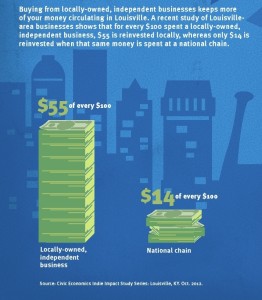Political stump speeches differ very little from religious sermons, and that’s probably why we call it a bully pulpit, not a milk crate.
However, a soapbox might be useful, or better yet, a couple cases of Bud Light in tall cans, because if the pet shampoo is too disgusting to drink, at least you can stand atop it and preach.
(By the way, President Theodore Roosevelt was the originator of the “bully pulpit” usage. Roosevelt was one of the last and best examples of a species now extinct, the progressive Republican)
During these past few years at the bully pulpit, I’ve endeavored to echo two important, recurring themes – economic localization and shift – because both notions should be of interest to the well-informed craft beer drinker, even if their foundations are rooted elsewhere.
Beer loving Louisvillians are familiar with LIBA, the independent business association that coordinates the annual Louisville Brewfest. LIBA works to “Keep Louisville Weird,” primarily through advocacy and education about the fundamental merits of economic localization. My city’s admittedly embryonic version of the same is called New Albany First, and my company, New Albanian Brewing Company, belongs to both organizations.
A chart provided by LIBA (right) illustrates in simple, introductory fashion one aspect of the stakes involved with localism. The chart has to do with circulation and reinvestment.
These and other topics pertaining to economic localization can be explored at one’s leisure, and at numerous web sites. Here are two of them: AMIBA and BALLE.
At LIBA’s web site, I’m struck by this single, brief paragraph. There is much to consider in just these few words.
Each time we spend a dollar, LIBA encourages you to weigh the full value of your choices, not solely to yourselves immediately, but for the future you want for Louisville.
Granted, it may not seem immediately evident that one’s spending choices have value, although we’ve long seen that a principled refusal to spend can make a difference when such a calculated abstention aims at facilitating a desired end, as in the practice known as the boycott – so named after Charles C. Boycott, a 19th-century English property manager in Ireland, who was targeted by an organized, non-violent, systematized campaign of disinvestment that eventually came to be named in his dishonor.
A more recent example of sustained economic sanctions came during the 1980s, when numerous investors, from institutions to corporations, and from individuals to governments, expressed their protest against apartheid in South Africa by an international campaign of disinvestment. The objective of this boycott was to compel South Africa to commence the dismantlement of institutionalized discrimination, which in time did indeed occur.
However, for those readers despairing of history lessons buried within a beer column, LIBA’s wording suggests outcomes ranging beyond those pertaining merely to the withholding of expenditures. In fact, one’s spending choices absolutely can reflect positive, active shadings of value beyond the short term and ephemeral … so long as they are weighed, a notion that implies thought and at least some measure of deliberation.
I believe that most self-identified beer lovers/enthusiasts/aficionados grasp instinctively this crucial point in a broad sense. They realize that in a modern consumer society driven by mass marketing, saturation advertising and various insider tricks (legal or otherwise), those dedicated to pursuing better beer must learn to disregard norms previously judged as acceptable, and instead to think their way past the easiest and most commonly available beer, not to mention the cheapest.
Grasp is one thing and reach quite another, and for this reason, I view the second significant pillar of economic localization to be the ongoing process of shift, which by its very nature is gradual.
In an economic system largely predicated on non-local spending, where there may not be an independent grocery or filling station (whether it dispenses gasoline, beer or both) to patronize, cold turkey isn’t always an option.
Rather, one begins to support economic localization by shifting spending where and when such a shift is practical.
Perhaps the single greatest misconception greeting soapbox speakers like me who tout economic localization is that the listener is being expected to boycott non-local entities in their entirety, and either buy local or starve. Nothing could be further from the truth, and the forward march of better beer is a fine example.
That’s because craft beer itself did not explode full-blown into the phenomenon it is in this day and age. Craft beer evolved and grew slowly and continuously over three decades, incorporating constant shift as breweries were established and communities served. Now most of the country is within range of a craft brewery, and with proximity comes a wider array of choice.
When it comes to craft beer, the implications of economic localization and shift are increasingly obvious. You needn’t digest them all at once. Little sips work just fine.
—
After I’d already started writing this column, a new variable was interjected, and I feel obliged to address it.
Last week, NABC inked an agreement to distribute 22-oz bomber bottles in limited quantities to the Ohio market through Cavalier Distributing Ohio. It’s a strategy I always imagined we might pursue at some point, although the timing was unpredictable. Before NABC could manage it, we had to be able to do so logistically, and an Ohio wholesaler had to want us. The planets suddenly aligned, and here we are.
Appropriately, a friend and NABC supporter immediately proffered this excellent question:
How does shipping beer to Ohio fit in with a “buy local” message?
Here’s my answer:
Economic localization involves the incremental shifting of spending choices. Shift is ongoing, and shift happens. It’s real. As the shift evolves and a dynamic craft beer market further progresses, we brewery owners must nonetheless continue to view our marketplace the way it actually functions, not the way we wish it to function some day in the future. We live and work in the present as we strive for the ideal. We make decisions accordingly, and hope that they bear fruit.
During the recently concluded Indiana U.S. Senate campaign, eventual winner Joe Donnelly was asked by a reporter whether he would renounce PAC money from outside the state’s boundaries – a particularly plentiful source of campaign financing for his opponent, Richard Mourdock. Donnelly said no, he would continue to accept out-of-state contributions, and he explained why he didn’t view this as hypocritical.
To paraphrase Donnelly: Until campaign finance reform is bilateral and the playing field becomes level for all, a candidate cannot pursue campaign finance reform unilaterally; after all, the object in politics is to win, because without winning, how can the candidate pursue his platform?
The same goes for my business. Shift may be happening, but pieces of brewing equipment still are machines that make beer; using them makes money, and unfilled excess capacity costs money. Losses impede the business cycle, and the business cycle remains in large measure dependent on larger-scale market precepts. The regulatory regime precludes genuine marketing innovation.
I could go on, but probably you get my drift. In short, if you can do what must be done while retaining the bulk of your principles, there can be restful sleep … and bills are paid. My fundamental objective remains as before: Shifting toward economic localization on as many fronts, whenever and wherever possible.
As I pursue this objective, selling more beer to the folks nearest to our brewery is a priority. Concurrently, pragmatism ordains a clear view of other business prospects in other places – apart from selling NABC beer to Big Red Liquors, of course.
After all, some compromises are just too onerous to contemplate.






